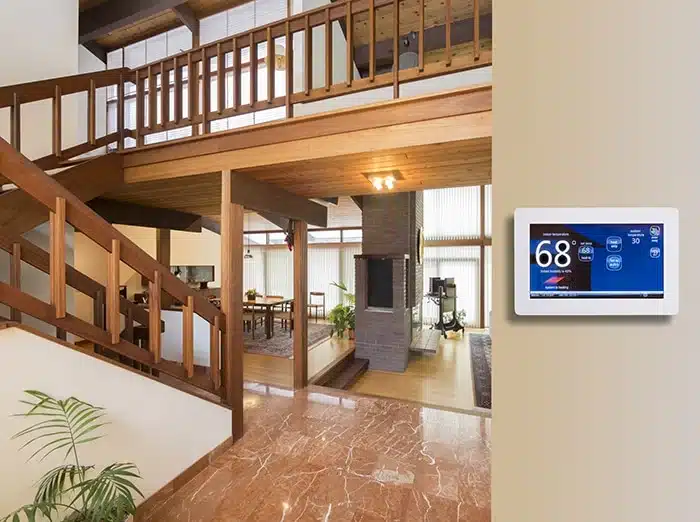The upcoming first day of summer means hot weather is already upon us in the Tri-Cities. This translates into higher electric bills as we crank the air conditioner units in our homes.
Heating and cooling our homes accounts for 48 percent of Americans’ total energy consumption, according to the U.S. Department of Energy (DOE). This means the related costs make up a significant portion of the average consumer’s energy bill.
This prompts us to wonder if we can recoup energy savings with lower utility bills if we turn off the air conditioning in the summer when we leave our homes. After all, this is the season for vacations and travel.
Install a WEB ENABLED Programmable Thermostat (or smart stat) to Simplify Empty House Settings
An easy way to save on your utility bills when your house is unoccupied is to install a programmable thermostat. You will then be able to schedule in the times of day that your house is normally empty. Your thermostat will adjust your temperature settings automatically. Or if you would prefer it to be more automated, we offer Smart thermostats that can sense if you are home or not based on motion sensors that will automatically set your thermostat temperatures back when you are away. What’s more, a programmable thermostat will begin to cool your home before you return, making your home temperature ideally comfortable as soon as you come into the house.
What Temperature Should You Set the Thermostat in Summer?
Common sense dictates that you should adjust your thermostat slightly higher while you are on vacation to save on your utility bill. As the DOE reports, for every degree you increase the set temperature of your central air, you will save approximately three percent on your energy bill.
It is recommended that for the optimum setting on your air conditioning while you’re away you should adjust it to 4 degrees or 5 degrees higher than your normal settings when you are home. For example, if you usually set your air conditioner to 72 degrees, increase the setting to 77 degrees or 78 degrees before you leave your home. You should also check your air conditioner filter and close the blinds prior to leaving your house.
Changing your thermostat to even a higher setting will likely not save you more money because the central air conditioning unit works that much harder to cool your home’s temperature back down when you return. Under no circumstances should you turn off your AC unit in hot weather while you’re gone as you could cause damage to the wall structure and household items if it is hot and humid in your home.
Short-Term Vacancy
With the trademark hot and dry weather of the Tri-Cities, it is tempting to leave the HVAC unit on when you leave your house. It is understandable to want a cool house to come home to in the summer. But it is not worth the expense when it comes to running your AC unit for eight to 10 hours while you’re gone, according to energy experts.
The DOE recommends adjusting your thermostat by 10 degrees to 15 degrees when you are leaving for several hours or so. The DOE also advises to set your thermostat to
78 degrees in the summer and 68 degrees in the winter when you are home to be more environmentally friendly.
There are other ways to keep your home calibrated to near ideal temperatures that does not involve mechanics. For example, in the summer completely close the reflective blinds on a sunny window, which can result in a 45 percent reduction in heat gain.
Similarly, in the summer close your drapes during the day as that can reduce the daytime temperature in your home. The DOE suggests that heat increases in your home can be decreased by 33 percent with medium-colored drapes comprised of white, plastic backings. During the winter, you would open your blinds and drapes during the day to capture daytime heat.
Long-Term Vacancy
If you plan to be away from your home for long periods of time, there are various factors to consider when deciding whether to heat or cool your unoccupied home.
“It is more economical to leave the heating and cooling system off in an unoccupied building,” said Darin Nutter, professor and department head of the Mechanical Engineering and 21st Century Leadership Chair in Engineering at the University of Arkansas.
However, Nutter warns that you might want to hold off on shutting down your utilities before you leave for an extended period of time if you live in a wetter climate, like Seattle.
“There is one real concern based on the building’s location and condition – moist air entering the house and the potential development of mold,” Nutter said.
However, being that the Tri-Cities is known for hot, dry weather with our desert climate, excess moisture is not a likely to occur.
When it comes to the winter, the DOE advises against having the inside temperature of your house drop too low because the kitchen and bathroom pipes might not be insulated.
Setting the thermostat between 40 degrees and 45 degrees ought to provide an adequate buffer.
Look to Apollo Heating and Air Conditioning for AC Inspection
Now that it’s summer, it’s time to have your central air conditioning inspected to ensure it operates at maximum efficiency for the entire season.
We invite you to contact Apollo Heating and Air Conditioning by calling (509) 396-COLD (2653).




